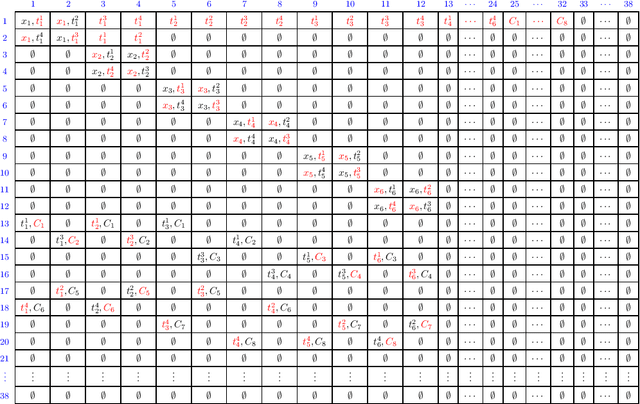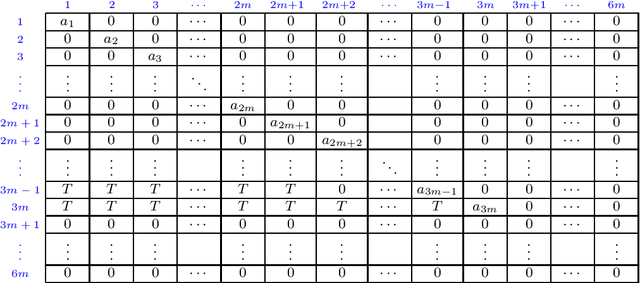Mohammad Azharuddin Sanpui
Resource Allocation under the Latin Square Constraint
Jan 11, 2025


Abstract:A Latin square is an $n \times n$ matrix filled with $n$ distinct symbols, each of which appears exactly once in each row and exactly once in each column. We introduce a problem of allocating $n$ indivisible items among $n$ agents over $n$ rounds while satisfying the Latin square constraint. This constraint ensures that each agent receives no more than one item per round and receives each item at most once. Each agent has an additive valuation on the item--round pairs. Real-world applications like scheduling, resource management, and experimental design require the Latin square constraint to satisfy fairness or balancedness in allocation. Our goal is to find a partial or complete allocation that maximizes the sum of the agents' valuations (utilitarian social welfare) or the minimum of the agents' valuations (egalitarian social welfare). For the problem of maximizing utilitarian social welfare, we prove NP-hardness even when the valuations are binary additive. We then provide $(1-1/e)$ and $(1-1/e)/4$-approximation algorithms for partial and complete settings, respectively. Additionally, we present fixed-parameter tractable (FPT) algorithms with respect to the order of Latin square and the optimum value for both partial and complete settings. For the problem of maximizing egalitarian social welfare, we establish that deciding whether the optimum value is at most $1$ or at least $2$ is NP-hard for both the partial and complete settings, even when the valuations are binary. Furthermore, we demonstrate that checking the existence of a complete allocation that satisfies each of envy-free, proportional, equitable, envy-free up to any good, proportional up to any good, or equitable up to any good is NP-hard, even when the valuations are identical.
Externalities in Chore Division
Mar 22, 2023



Abstract:The chore division problem simulates the fair division of a heterogeneous undesirable resource among several agents. In the fair division problem, each agent only gains value from its own piece. Agents may, however, also be concerned with the pieces given to other agents; these externalities naturally appear in fair division situations. Branzei et ai. (Branzei et al., IJCAI 2013) generalize the classical ideas of proportionality and envy-freeness while extending the classical model to account for externalities.
Chore Cutting: Envy and Truth
Jan 23, 2023Abstract:We study the fair division of divisible bad resources with strategic agents who can manipulate their private information to get a better allocation. Within certain constraints, we are particularly interested in whether truthful envy-free mechanisms exist over piecewise-constant valuations. We demonstrate that no deterministic truthful envy-free mechanism can exist in the connected-piece scenario, and the same impossibility result occurs for hungry agents. We also show that no deterministic, truthful dictatorship mechanism can satisfy the envy-free criterion, and the same result remains true for non-wasteful constraints rather than dictatorship. We further address several related problems and directions.
Proportional Fair Division of Multi-layered Cakes
Aug 01, 2022



Abstract:We study the multi-layered cake cutting problem, where the multi-layered cake is divided among agents proportionally. This problem was initiated by Hosseini et al.(2020) under two constraints, one is contiguity and the other is feasibility. Basically we will show the existence of proportional multi-allocation for any number of agents with any number of preferences that satisfies contiguity and feasibility constraints using the idea of switching point for individual agent and majority agents. First we show that exact feasible multi-allocation is guaranteed to exist for two agents with two types of preferences. Second we see that we always get an envy-free multi-allocation that satisfies the feasibility and contiguity constraints for three agent with two types of preferences such that each agent has a share to each layer even without the knowledge of the unique preference of the third agent.
 Add to Chrome
Add to Chrome Add to Firefox
Add to Firefox Add to Edge
Add to Edge